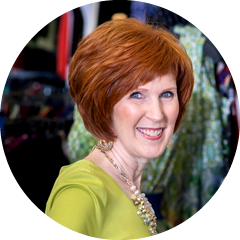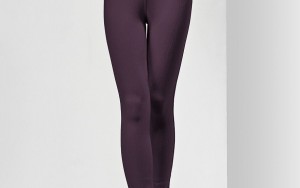“When I was a kid, I overheard one of my aunts say to my mother
that it was a good thing I was smart, as I wasn’t very pretty.
It made me feel as if I had no right to try to look pretty –
it would always be out of my reach.”
–survey participant

We all want to and deserve to feel beautiful! Unfortunately, this doesn’t always happen and there are many reasons why. For instance, not being able to tap into your feeling of beauty can range from not liking how you look in a garment you’re wearing to realizing the color makes you look blah or feeling perplexed as to what shoes make the outfit a winner.
The good news is that those reasons are easily fixable.
A much more insidious reason you might not feel good about how you look is the result of past trauma in the form of hurtful comments and unwanted advice about your body or personal style. These comments happen much too often and can easily impact your ability to fully appreciate how you look and how you dress. I’ve heard this a lot from the women I work with.
What kinds of hurtful comments and unwanted advice are we talking about?
A number of years ago I conducted a survey to find out what had been said to someone or the kinds of ‘advice’ that had been given to women that made them feel badly about themselves. The responses were mind-blowing!
I’ll share some of these and the stories I heard.
I hope that if you’ve had a similar experience, that this information will help you release some of the strangle hold it can have on your ability to see your body’s beauty and dress in a way that makes you smile.
Hurtful Comments & Unwanted Advice…Their Impact
“Unfortunately, I must say that it is comments from other people that affect my self-esteem. Although I have made tremendous progress in this area, my feelings are still affected by a comment that someone makes, be it positive or negative.” – survey participant
Have you ever overheard someone make a critical or unkind remark about how you look? Or, perhaps they criticized you directly to your face? If so, how did it make you feel? Did your mood plummet? Did you head for the nearest ladies’ room to scrutinize the offending body part, article of clothing, or style selection? Did you internalize this criticism (sometimes in the guise of helpful advice) or shrug it off as simply someone else’s opinion?
If you openly admit that you were deeply affected by the remark, you are not alone.

When I asked my clients what unsolicited comments or advice had been given to them throughout their life and how it impacted their perception of themselves and their self-esteem, the responses were heartbreaking. Too often, people freely give critical advice about how someone looks with little thought to whether the other person wants it, is ready to accept it or if it’s even necessary (which it rarely, if ever, is).
To make matters worse, they seldom think about the effects of what they say, often do not soften their delivery and are sometimes even purposefully hurtful.
As one woman shared, “One evening I was wearing something I particularly liked and felt good in. Believe it or not, a ‘friend’ said to me, ‘Don’t you want to try wearing something else? I mean, that looks okay, but it might be better wearing something different.’ The dress was new and the comment ruined the night for me. The next day I gave the dress to Morgan Memorial.”
Few of us take comments like this lightly or skip easily over them. We forget (understandably) that it is more often a statement about the person making the remark than it is about us. If we can attribute it to someone else’s bad day, feelings of envy, or deep seeded need to feel better than someone else, we would be much better off.
Sadly, when someone makes a remark of this kind, however, our self-esteem takes a direct hit. It often leaves us reeling, feeling embarrassed, ashamed or despondent. Only the most stalwart are immune, and I have met few who can honestly weather this kind of attack with no fallout.
Well-meaning or not, here is the impact a comment can have: “Many times when my mom saw an outfit I was wearing, she would make comments like…. ‘oh, a pin would look so nice with that, or why don’t you wear this necklace too, etc…’ It made me feel that what I was wearing wasn’t good enough. I always felt like I needed my mom’s approval…and I still feel like that, and I’m 41 years old.”
One woman shared how a “friend” asked her one day if she had been to a dermatologist. “I don’t know why, but I assumed she was going to comment on how nice my skin was. Instead, she pointed to a small mole on my face and said, ‘How come you don’t have that taken off?’ I was totally caught off guard. I don’t think I’d ever even thought about it and maybe only really noticed it once or twice. Although slightly unnerved, I told her I’d never really thought about it. Her response, believe it or not, was to say that she wished she didn’t care so much about how she looked and what others thought. I truly wish, in hindsight, that I had let her know what a distasteful comment that was!”
Just to show you that sometimes it feels like you can’t win, one woman shared, “The thing I’ve always had to put up with over the years whenever I went somewhere was “Why are you so dressed up”? This was particularly prevalent when I was younger (high school and especially college). I used to feel bad about the fact that I had a nice outfit on and they would be in their old jeans and t-shirt. As I got older, I just decided that I didn’t care. I would dress the way I wanted and they could dress the way they wanted. I am usually still dressed up more than most people when my husband and I go out, but I’ve just decided that is me and what I am about. If they are about T-shirts and jeans, I don’t condemn them for that, just don’t tell me how I should dress!
That situation is a big one that we regularly hear these days especially since the pandemic. It’s somehow considered bad form, unnecessary or inappropriate to wear something that’s interpreted as slightly dressy!
With all of these types of comments, the impact can be devastating and can affect many parts of our lives for many years. Sometimes time heals and sometimes working with a good therapist can help you move past the hurt.
As one woman shared, it can also make us more sensitive to the power of the words we use. “As a child I was ‘chubby’ and one evening while my sisters and I were catalogue shopping I found a very cute dress that I absolutely fell in love with. When I showed it to my mother, she scoffed and said ‘I can’t order that for you, it doesn’t come in a husky size.’ I was hurt and horrified that she said that to me and in front of my siblings who thought it was the funniest thing they had heard. I have never forgotten that hurtful comment and have made a point to try and temper anything I say to my children with a little more kindness.”
The first aspect (and sometimes the hardest) of dealing with ‘hurtful comments and unwanted advice’ is creating awareness. Sometimes, especially if these comments were made to us many years ago, we have internalized them and see them as true without even thinking about them. Shining a light on these inappropriate comments can allow you to acknowledge the hold they have on your self-esteem and encourage some healing to begin.
As one survey participant said, before she revealed her list of hurtful comments she had received, “I’ve got a ton of them, and I’m going to go ahead and repeat them as resentfully as I like.” And, after she listed them thoroughly, she admitted, “Gee whiz, that was fun!” She felt a sense of being heard and of just getting some of the anger and resentment off her chest.

If this all sounds familiar, then the next step, of course, is loosening the strangle hold they have on your self-esteem. While this awareness alone cannot undo years of resentment and hurt, it can, perhaps, reduce some of the pain, provide some insight, and allow you to move on—either on your own or perhaps with the help of a qualified therapist (of which I’m a huge advocate).
What Makes People Say These Things?
One has to wonder honestly what possesses someone to say mean-spirited things. Perhaps it is ignorance, envy or some strange sense that saying these things is a way to motivate or even shame someone into action. Some people even have a misguided sense that they know best. The funny thing is that even if this is true (and it often is not) there is no justification for offering unsolicited, damaging information disguised as helpful advice.
Let me repeat that: there is no justification for offering unsolicited, damaging information disguised as helpful advice.
As one woman sadly revealed, “In my late teens, a male supervisor at a temp job said, ‘I’d really like to get you to a hairdresser. You could use some fixing up.’ I was young and had very little self-confidence, so it just made me feel terrible. With some prodding from a co-worker this supervisor did apologize, but by then the damage was done.”
Having worked in the image profession for over 30 years, I obviously have expertise in the area of style and image. And, yet, never, no matter how much I think someone might benefit from my guidance, do I ever offer advice unless I’m asked? Never. Not to my friends, clients, relatives, partner, or anyone.
It is no secret that how we look is a deeply personal issue. Even though I can be the most diplomatic person on earth and all of my advice is always offered sensitively, if someone is not ready or does not want my opinion, then I will not presuppose they do. I have seen too much damage done by well-meaning people to inflict that kind of harm on anyone.
Whether we admit it or not we all want to look good, and everyone can have a different interpretation of what it means to look good. It is no surprise, however, that for most women self-esteem is at least partially wrapped up in how they feel about how they look. Given all the mixed messages out there, it is also no surprise that many women have a distorted view of how they look and rarely does it err on the positive side.
One client, Christine, introduced herself in an e-mail indicating that she needed help with her image. She had a litany of concerns, beginning with, as she described them, unmanageable hair, bad skin, enormous hips and hard to fit feet. She felt like she never looked stylish and longed to feel attractive.
The woman who walked into my studio the day of our consultation was petite and neatly dressed in lovely colors—a far cry from the image I had conjured up after her self-portrait.
Was I surprised? Sadly, no.
Although this was an extreme case, Christine is not unusual in her perception of herself. She had little, if any, concept of how lovely she was. She saw only what she perceived to be her flaws, exaggerated 10-fold.
Why is this way of thinking so prevalent?
Our society’s unhealthy obsession with youth and ephemeral physical beauty has tainted people’s perception of themselves. Magazines, TV shows and just plain bad manners have seemingly given license to people to criticize, humiliate and harass others into feeling badly about themselves if they don’t meet these prescribed ideals.
Friends, family and even strangers feel that they have permission to freely and openly comment on someone’s appearance. And, we are not talking about delightful compliments and encouraging words. We are referring to comments that are consciously, unconsciously, or passive aggressively hurtful. Sadly, uniqueness and individuality have taken a backseat to standardized beauty. While celebrating someone’s uniqueness, rather than criticizing them for it, is changing, we still have a way to go.
Comments from Family
It always amazes me that family members seem to think they have been bestowed some special privilege to dispense critical comments freely to other family members. Why would this be? As you have seen, some of the cruelest comments have been made by family members so this point bears repeating. In fact, if you ask women (perhaps men, too?), you will often find that some of the most hurtful and long-lasting comments came from family members—just the people we rely on to support and encourage us.
Sadly, the damage can last a lifetime.
“I was in high school and wearing a skirt that landed just above my knees. My mother considered it for a minute and then flatly told me that I should only wear skirts that cover my knees. That way people might notice my calves, which she then called my ‘best asset.’” I imagine she thought she was complimenting my calves, but I didn’t hear it that way.
She continued, “Instead, I heard two things:
- “Your knees are ugly — you have to keep them covered to make people think you might have nice legs.”
- “Your calves are your best asset.” In other words, there is nothing else on your body or in your personality that is as nice as your calves.” Not my eyes (which I had always liked), my laugh, my intelligence, my tanned swimmer’s body (which is how I got the nice calves, by the way).”
Can you picture yourself in that situation or this one: “I had spent the previous year since my third baby arrived getting back into my pre-babies body shape. Through diet and a serious exercise plan, I had lost 15 pounds, was back into a comfortable size four and feeling really great about myself. I actually went and bought my very first bikini for a vacation and some form fitting (but still conservative) clothes to highlight all the good parts of my body. Everybody had been complimenting me on how great I’d been looking. When my family arrived, I was wearing a cute, flirty little skirt (just the type of thing Mom would pick out for me, too!) and she immediately pats my belly and teases me about looking like I’m pregnant! I have long since thought that I was immune to my mother’s criticisms, but that day, I cried. Couldn’t she have pointed out how great my hair was? Or, how nice the outfit was? (She did like the outfit by the way. It’s just that for whatever reason, she just can’t resist making some kind of negative comment, even in jest).”
This woman does go on to acknowledge, “I am rational enough to recognize that my mother has her own inferiority issues that she has obviously struggled with throughout most of her life (the stories I could tell!), and feel pity for her about that, but the fact that she feels the need to make herself feel better by always (and probably unconsciously) belittling me is awful.”
The amount of damage a thoughtless comment can make is mind-boggling! Women have shared their inability to release these comments from their consciousness. As one woman shared, “When I was young my brother would constantly make fun of my nose… I’m Italian so I had a bump on my nose (a Roman nose). He would say I looked like a witch, etc… It ended up that I felt so self-conscious, I had a nose job when I was a teenager. I’m really glad I had it done and I love my nose now, but I’ll never forget my brother’s comments and how it made me feel (still some 20 years later!).”
If you are still reading this, I suspect either you’ve been at the mercy of similar kinds of challenging comments and/or you’re extremely sensitive already to how negative comments can impact someone. In which case, feel free to share this article with someone who doesn’t get it! Without exception, unless your opinion and advice are requested and can be offered with love and grace, even if (or maybe especially if) you are a family member, keep your thoughts and opinions (and that’s all they are…your opinions) to yourself!

Everyone deserves to feel beautiful and these outside influences can wreak havoc on one’s self-esteem and not just momentarily but sometimes…often…for years to come.
* * *
There is much more to say on this topic, so stay tuned:
- What if you really do have someone’s best interests at heart?
- When is it okay or not okay to offer advice?
- What are the top two hurtful comments and unwanted advice offenders?
- When it is appropriate and warranted to say something about someone’s appearance, and how to do it with compassion if at all.






One Response
Thank you for posting this!